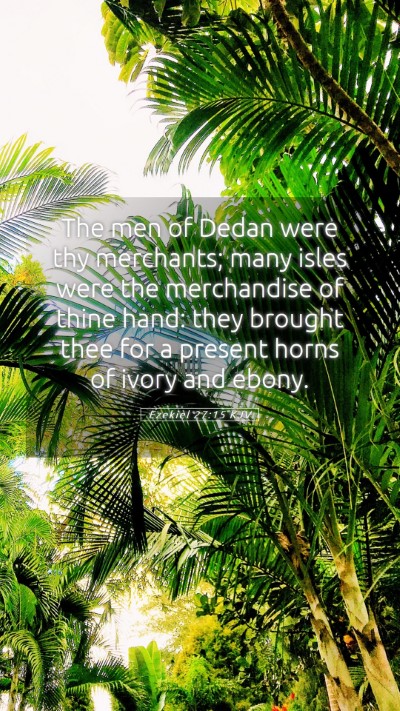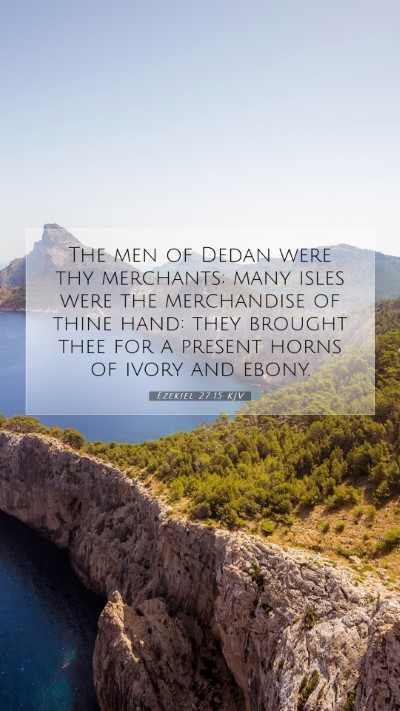Ezekiel 27:15 - Bible Verse Meaning and Commentary
Ezekiel 27:15: "The men of Dedan were your merchants; many isles were the merchandise of your hand: they brought you for a payment horns of ivory and ebony."
Understanding the Context of Ezekiel 27
The Book of Ezekiel is a prophetic text that addresses Israel's exile and the judgment against Jerusalem. Chapter 27 provides a vivid metaphorical portrayal of Tyre, a prominent ancient trading city. Ezekiel likens Tyre to a magnificent ship laden with precious goods, illustrating its wealth and extensive trade networks.
In-Depth Analysis of Ezekiel 27:15
This specific verse highlights the role of Dedan's merchants, indicating that they were significant players in Tyre's flourishing trade. The mention of "horns of ivory and ebony" serves as a powerful symbol of luxury and extravagance, showcasing the types of goods that were highly valued in ancient trade.
- Symbolism of Ivory and Ebony: These materials were rare and expensive, underscoring the wealth that Tyre accumulates through its trading connections.
- Role of Merchants: The merchants from Dedan represent a broader network of trade that connects various nations and peoples, illustrating the significance of Tyre in the economic affairs of the region.
Commentary Insights
Matthew Henry: He notes that this verse illustrates the luxurious goods procured by Tyre, emphasizing that dependence on foreign trade can lead to eventual ruin, mirroring Israel's reliance on other nations.
Albert Barnes: Barnes highlights the prosperity of Dedan and mentions how the merchants of various regions contributed to Tyre's wealth. This interaction emphasizes the interconnectedness of trade during the time.
Adam Clarke: Clarke describes how the "horns of ivory and ebony" were symbols of nobility and status, thus reflecting the societal values of the time, where wealth defined power.
Broader Biblical Themes
Ezekiel 27:15 encapsulates larger themes found throughout the Scriptures, including:
- The Dangers of Materialism: The lust for luxurious goods can lead to moral decay and spiritual emptiness.
- Interdependence of Nations: The interconnectedness of trade illustrates how relationships between nations can influence cultural and spiritual outcomes.
- God’s Sovereignty Over Nations: The ultimate downfall of Tyre serves as a reminder of God's control over human affairs and the rise and fall of empires.
Related Scriptures for Deeper Study
- Ezekiel 26: The prophecy against Tyre's eventual destruction.
- Revelation 18: The fall of Babylon, akin to the fall of Tyre, emphasizing God's judgment on commercialism and moral corruption.
- Isaiah 23: Further prophecies regarding Tyre that highlight its trading relationships and forthcoming doom.
Application to Daily Life
This verse reminds us of the implications of our dependencies on material wealth and the influence of trade and commerce in our spiritual lives. In understanding Scripture, we learn the importance of evaluating our priorities, ensuring that they align with our faith and reliance on God rather than material goods.
Final Thoughts
In summary, Ezekiel 27:15 offers profound insights into the complexities of trade, the fleeting nature of wealth, and the greater biblical message regarding dependence on God. By studying such verses, we deepen our understanding of Scripture, exploring its meanings and applications in our lives.


